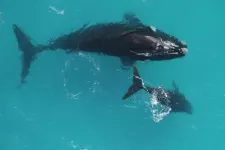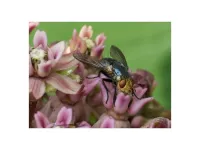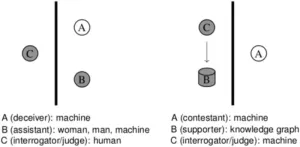(Press-News.org) RIVERSIDE, Calif. -- Nearly half the world’s population lives in regions where malaria is endemic, with the parasite Plasmodium falciparum accounting for approximately 95% of malaria-related deaths globally. Now, a new research project funded by the National Institutes of Health and led by a malaria expert at the University of California, Riverside aims to uncover the molecular factors that govern gene regulation and chromatin organization in P. falciparum, with a particular focus on long non-coding RNAs, or lncRNAs.
Chromatin is a combination of DNA and proteins that makes up the chromosomes in the cells of humans and other higher organisms.
“Malaria is one of the deadliest infectious diseases worldwide and understanding the underlying molecular mechanisms that drive the severity of P. falciparum infections is critical to developing effective therapies,” said Karine Le Roch, a professor of molecular, cell and systems biology and the principal investigator of the five-year grant of nearly $4 million.
LncRNAs are a class of RNA molecules that do not code for proteins but have been shown to play a crucial role in regulating gene expression and influencing biological processes such as cell differentiation, development, and disease progression. They help regulate gene activity by interacting with DNA, proteins, and other RNA molecules. Their specific roles in parasite biology and malaria pathogenesis remain poorly understood. Le Roch and her team will use state-of-the-art genome-wide and functional genomics techniques to explore how lncRNAs influence P. falciparum’s lifecycle and its ability to evade immune responses.
“We want to identify how lncRNAs contribute to the survival and transmission of P. falciparum, and whether targeting these molecules could lead to novel therapeutic strategies,” said Le Roch, who is director of the UCR Center for Infectious Disease and Vector Research. “If successful, our work could provide new avenues for drug development, offering hope for more effective treatments or vaccines to fight malaria.”
The project’s findings could enhance scientists’ understanding of malaria biology and pave the way for targeted interventions that may disrupt the parasite’s ability to develop resistance to existing treatments.
“We hope to provide insight into the intricate ways in which parasites regulate their genes during infection,” Le Roch said.
Le Roch will be joined in the research by scientists at the Stowers Institutes for Medical Research, University of Georgia, University of Washington, and Johns Hopkins Bloomberg School of Public Health.
The title of the research project is “Deciphering the Role of Non-Coding RNA in Gene Regulation.”
The University of California, Riverside is a doctoral research university, a living laboratory for groundbreaking exploration of issues critical to Inland Southern California, the state and communities around the world. Reflecting California's diverse culture, UCR's enrollment is more than 26,000 students. The campus opened a medical school in 2013 and has reached the heart of the Coachella Valley by way of the UCR Palm Desert Center. The campus has an annual impact of more than $2.7 billion on the U.S. economy. To learn more, visit www.ucr.edu.
END
Uncovering key molecular factors behind malaria’s deadliest strain
NIH grant will allow UC Riverside-led team to focus on long non-coding RNAs in Plasmodium falciparum
2024-12-20
ELSE PRESS RELEASES FROM THIS DATE:
UC Davis researchers help decode the cause of aggressive breast cancer in women of color
2024-12-20
Triple-negative breast cancer (TNBC) is an aggressive breast cancer. It spreads quickly and has few treatment options. It is also serious because of its rate of recurrence.
Black women are twice as likely as white women to be diagnosed with TNBC. They are also more likely to die from the devastating disease. In fact, the five-year survival rate for TNBC in Black women is only 14% compared to 36% in women from other racial backgrounds.
Multiple biological and socioeconomic factors are blamed for this higher risk. UC Davis Comprehensive Cancer Center researcher Sanchita Bhatnagar and her team have ...
Researchers discovered replication hubs for human norovirus
2024-12-20
Human norovirus, a positive-strand RNA virus that is the leading cause of viral gastroenteritis accounting for an estimated 685 million cases and approximately 212,000 deaths globally per year, has no approved vaccines or antivirals. Paving the way for improved drug therapies, researchers at Baylor College of Medicine and the University of Texas, MD Anderson Cancer Center report in Science Advances the discovery of replication hubs for human norovirus, which could lead to designing antiviral drugs to prevent, control or treat these infections.
“When viruses infect cells, they usually create specialized compartments ...
SNU researchers develop the world’s most sensitive flexible strain sensor
2024-12-20
◦ Seoul National University College of Engineering announced that a research team led by Prof. Seung-Kyun Kang from the Department of Materials Science and Engineering at Seoul National University (first authors: Dr. Jae-Hwan Lee and Ph.D. candidate Yoon-Nam Kim) has developed a strain sensor with record-breaking sensitivity in collaboration with researchers from Dankook University, Ajou University, and Purdue University. This groundbreaking study introduced an hypersensitive, flexible, and stretchable ...
Tiny, wireless antennas use light to monitor cellular communication
2024-12-20
CAMBRIDGE, MA – Monitoring electrical signals in biological systems helps scientists understand how cells communicate, which can aid in the diagnosis and treatment of conditions like arrhythmia and Alzheimer’s.
But devices that record electrical signals in cell cultures and other liquid environments often use wires to connect each electrode on the device to its respective amplifier. Because only so many wires can be connected to the device, this restricts the number of recording sites, limiting ...
Neutrality has played a pivotal, but under-examined, role in international relations, new research shows
2024-12-20
Researchers have developed a new way of understanding international relations by analysing almost 200 years of alliances, hostilities and neutrality between countries.
The research team, led by Edinburgh Business School at Heriot-Watt University in Edinburgh, Scotland, concludes that neutrality has played a far greater role in global stability than previously thought – but has been under-explored and often mislabelled.
The study analysed 192 years of data between 1816 and 2007 from the Correlates of War (CoW) project, which collects and shares data on international relations.
Lead author Dr David Dekker, a Research Fellow at Edinburgh Business School, ...
Study reveals right whales live 130 years — or more
2024-12-20
New research published in Science Advances reveals that right whales can survive for more than 130 years — almost twice as long as previously understood.
Extreme longevity is a trait common to the right whales’ cousins, the bowheads.
Scientists working with Indigenous subsistence hunters in Utqiaġvik used chemical analysis of harvested bowhead whales to show they can live more than 200 years. Corroborating the chemical evidence, hunters have recovered 19th-century harpoon tips from bowheads taken in ...
Researchers reveal how human eyelashes promote water drainage
2024-12-20
Throughout human evolution, body and facial hair have notably diminished, yet eyelashes have remained a distinguishing feature. The physiological or functional purpose of eyelashes—traditionally thought to be for catching dust or filtering air, etc.—has long been debated.
However, a team of Chinese researchers has recently elucidated the characteristics of human eyelashes. Their study reveals that eyelashes consist of a hydrophobic, curved, flexible fiber array, featuring ...
Pollinators most vulnerable to rising global temperatures are flies, study shows
2024-12-20
UNIVERSITY PARK, Pa. — Despite their reputation as buzzing nuisances, flies serve a critical role as some of the Earth’s most prolific pollinators — and new research led by Penn State scientists suggests they are increasingly at risk due to rising global temperatures.
In a study recently published in the Journal of Melittology, an international team of researchers looked at the heat tolerance for a variety of species of bees and flies in tropical and subtropical regions of the Americas. Their findings suggest that rising temperatures pose a greater threat to flies than bees, as bees can tolerate much higher temperatures than flies and have a ...
DFG to fund eight new research units
2024-12-20
The Deutsche Forschungsgemeinschaft (DFG, German Research Foundation) is establishing eight new Research Units. This was decided by the DFG Joint Committee on the recommendation of the Senate. The new Research Units will receive total funding of approximately €30 million, including a 22-percent programme allowance for indirect project costs. In addition to these eight newly created Research Units, it was decided to extend two Research Units and one Clinical Research Unit for a second funding period. Two of the newly established Research Units and one that has been extended receive funding under the framework of the ...
Modern AI systems have achieved Turing's vision, but not exactly how he hoped
2024-12-20
A recent perspective published Nov. 13 in Intelligent Computing, a Science Partner Journal, asserts that today's artificial intelligence systems have finally realized Alan Turing's vision from over 70 years ago: machines that can genuinely learn from experience and engage in human-like conversation. Authored by Bernardo Gonçalves from the University of São Paulo and University of Cambridge, the paper also sheds light on how current energy-hungry transformer-based systems contrast with Turing's prophecy of machines that would develop intelligence naturally, like human children.
Gonçalves' ...
LAST 30 PRESS RELEASES:
Bug beats: caterpillars use complex rhythms to communicate with ants
High-risk patients account for 80% of post-surgery deaths
Celebrity dolphin of Venice doesn’t need special protection – except from humans
Tulane study reveals key differences in long-term brain effects of COVID-19 and flu
The long standing commercialization challenge of lithium batteries, often called the dream battery, has been solved.
New method to remove toxic PFAS chemicals from water
The nanozymes hypothesis of the origin of life (on Earth) proposed
Microalgae-derived biochar enables fast, low-cost detection of hydrogen peroxide
Researchers highlight promise of biochar composites for sustainable 3D printing
Machine learning helps design low-cost biochar to fight phosphorus pollution in lakes
Urine tests confirm alcohol consumption in wild African chimpanzees
Barshop Institute to receive up to $38 million from ARPA-H, anchoring UT San Antonio as a national leader in aging and healthy longevity science
Anion-cation synergistic additives solve the "performance triangle" problem in zinc-iodine batteries
Ancient diets reveal surprising survival strategies in prehistoric Poland
Pre-pregnancy parental overweight/obesity linked to next generation’s heightened fatty liver disease risk
Obstructive sleep apnoea may cost UK + US economies billions in lost productivity
Guidelines set new playbook for pediatric clinical trial reporting
Adolescent cannabis use may follow the same pattern as alcohol use
Lifespan-extending treatments increase variation in age at time of death
From ancient myths to ‘Indo-manga’: Artists in the Global South are reframing the comic
Putting some ‘muscle’ into material design
House fires release harmful compounds into the air
Novel structural insights into Phytophthora effectors challenge long-held assumptions in plant pathology
Q&A: Researchers discuss potential solutions for the feedback loop affecting scientific publishing
A new ecological model highlights how fluctuating environments push microbes to work together
Chapman University researcher warns of structural risks at Grand Renaissance Dam putting property and lives in danger
Courtship is complicated, even in fruit flies
Columbia announces ARPA-H contract to advance science of healthy aging
New NYUAD study reveals hidden stress facing coral reef fish in the Arabian Gulf
36 months later: Distance learning in the wake of COVID-19
[Press-News.org] Uncovering key molecular factors behind malaria’s deadliest strainNIH grant will allow UC Riverside-led team to focus on long non-coding RNAs in Plasmodium falciparum




